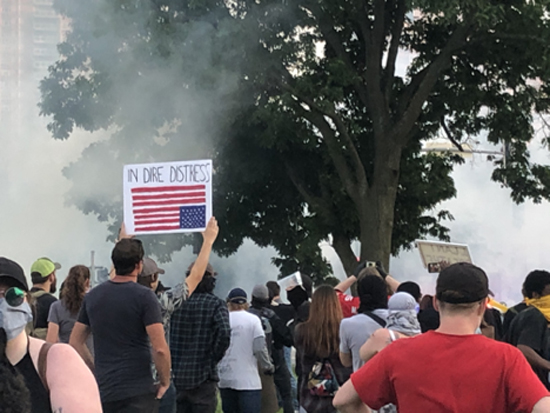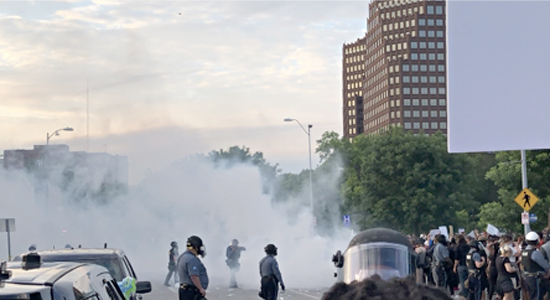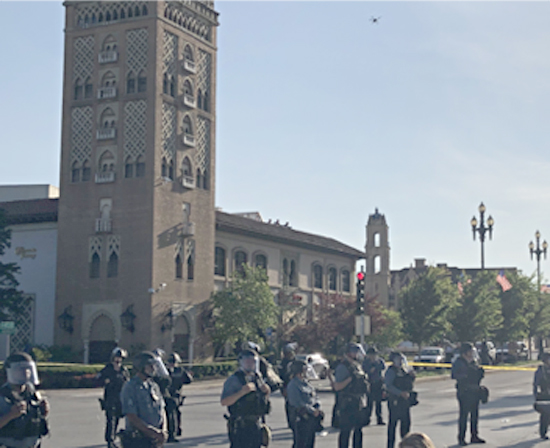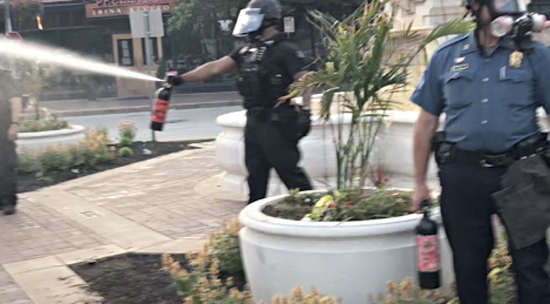"Crossing State lines to incite violence is a FEDERAL CRIME! Liberal Governors and Mayors must get MUCH tougher or the Federal Government will step in and do what has to be done, and that includes using the unlimited power of our Military and many arrests. Thank you!"
President Donald Trump in a tweet, 1:20pm Saturday, May 30, 2020

Worth a thousand words? Deployment of tear gas in the park near the JC Nichols fountain in Kansas City, 8:22pm, 30 May 2020. (Author’s collection)
I’m not sure the president of the United States understands midwestern geography; or knows that there are two different Kansas Cities straddling a river and (further south) a remarkably straight arbitrary border. I was one of those who "crossed state" lines to join protesters in Kansas City, Missouri. Having served the empire so long, it’s a stranger feeling than it should – being lumped in with the "enemies." There were hundreds of others, naturally. Almost none of incited violence, though odds are Trump considers nearly all protest activity basically "subversive."
After all, KC – like so many U.S. locales – is an interstate metro area, with more folks living outside the city limits than within them. Some of the more populous suburbs are on the Kansas side of the line. Nitpicking aside, what’s truly striking is the carelessness of the "leader of the free world’s" pronouncements. "Unlimited power?" Of ostensibly the most powerful military in world history? Applied domestically? By any sober assessment this must qualify as incendiary and dangerous.
Has it come to this?
As a mid-level manager of imperial violence, I was regularly reminded that my words had meaning and consequences. However modest, by dint of my officer position – so went the ubiquitous rejoinder – anything I said around my soldiers sent a message and set an example, whether intended or not. So count me curious why more Americans – even vague (small c)onservatives – haven’t concluded that President Trump’s recent escalatory and inflammatory tweets disqualify him as commander-in-chief. Indeed, in such a moment – arguably the broader COVID one too – it’s starkly apparent that The Donald’s ignorance, insecurity, and wildly flawed character, has become a public safety hazard.
That said, having covered the "empire beat" some time now, it’s clear that a major story embedded in Trump’s recent incitements – and one barely challenged by mainstream media – is exposure of longstanding police militarization and the reckless resort (or threat) to actual troops for domestic suppression. Whatever one thinks of the George Floyd case, President Trump, and the national range of protest tactics – here, clearly, I wear my own "colors" quite publicly – these phenomena should concern every citizen.
So should Trump’s other provocative pronouncements. Like the minor matter of the president so politicizing a national crisis that – instead of calling for calm on all sides – he singled out "liberal governors and mayors" as "weak," and went on to suggest a counter-protest by his base. Make no mistake, his proposal – "Tonight, I understand, is MAGA NIGHT AT THE WHITE HOUSE???" – is a not-so-veiled call-out of his goons; deputized, so to speak, for vigilante justice. Furthermore, one can loathe "liberals," and even despise the protesters’ cause, yet still see the inherent irresponsibility and danger in these presidential words.
A War at Home
What makes an insurrection? This simple question seems relevant when the president keeps offering – or threatening – federal troops to state governors and the Pentagon has alerted active-duty soldiers for domestic employment. After all, the purported legal workaround to the otherwise problematic Posse Comitatus Act – precluding most domestic use of military force – is the Insurrection Act of 1807. Setting aside how archaic and deliberately vague this particular justification is, it’s difficult to understand how what’s unfolding in America’s streets qualifies as a rebellion. That Trump and his generals have set such a low threshold for "insurrection" should terrify liberty-loving Americans of all political stripes.
For once, let us eschew our lizard-brain instincts, take a collective breath, and consider the empirical-statistical realities of what’s unfolded (so far) on the ground. Yes, there has been looting, fires, even some violence. Yes, one can reasonably question or oppose such activities (though hopefully, like Dr. King recognize some of the potential roots and context). However, very few people have actually been killed in six days of nationwide unrest – and not all of them by protesters – which is rather remarkable given the scale of the crowds. By way of comparison, over a similar span in 1967 – in the city of Newark, New Jersey alone – 26 people, including a police officer, were killed. In other words, scale and scope matter. The president, policymakers, and press need to exhale and comport themselves before leaping into the militarized abyss.
Now I’m an Iraq War baby; which is to say – for my sins – service in that imperial debacle shook my worldview and misguided ethical-intellectual apathy. Forgive, then, what may seem ancient history to younger readers: the callous 2003 comments of George W. Bush’s Secretary of Defense Donald Rumsfeld. Ironic isn’t it, that the last "law-and-order" enthusiast Republican administration, took such a different view of civil disorder when it unfolded in America’s Iraqi "freedom" laboratory. Recall that when asked about the rising chaos – by the very Iraqis we’d been assured would "greet as liberators" – Mr. Rumsfeld’s cool and unconcerned reply was:
While no one condones looting, on the other hand, one can understand the pent-up feelings that may result from decades of repression and people who have had members of their family killed by that regime, for them to be taking their feelings out on that regime, and I don’t think there’s anyone in any of those pictures … (who wouldn’t) accept it as part of the price of getting from a repressed regime to freedom.
Here was one of the core architects of that predictably chaos-inducing invasion downplaying a real insurrection, replete with violence, and looting on an epic scale. Funny how leaders’ empathy evaporates when the looters – or just plain protesters – are American (and often black).
"Democracy is messy," this other Donald had then told us. And while absurd and obtuse in the particular context, historically speaking Rumsfeld wasn’t all wrong. However much many Americans have sanitized and canonized men like Martin Luther King and the 1950s-60s civil rights movement, it too was "messy," halting, internally contested, and often violent. So were campaigns advancing the abolition of slavery and labor rights. No movement is a monolith and few are strictly "peaceful." It has always been thus.
Widespread reporting, and my own experience at the Kansas City protests, also raises serious questions about the competence and standing rules of engagement of local police. In countless cases, law enforcement has acted lawlessly – their responses escalatory and disproportionate, whilst absent real accountability. Just today, a far from likeminded West Point classmate reminded me that in his (and my) experience, his soldiers treated detainees – many of whom had shot at them just minutes earlier – with far more respect and decency than the Minneapolis police officers did George Floyd. And while the US military’s wider record with prisoners was hardly pristine, I’ve also argued – regarding Eric Garner’s murder in Staten Island – that my troops would’ve been held more accountable for such an action than was the NYPD. Then again, when empire comes home – and they always do – Baghdad is Staten Island…or Minneapolis.
Only in some ways worse. Local law enforcement may walk, talk, act (and certainly dress) like ducks…I mean combat troops, but the point is they aren’t soldiers. Nor are they designed to be. Thus, when handed excess Pentagon war stock equipment – and a disturbing military mandate – their ill-disciplined, escalatory, and disproportionate responses hardly comes as complete shock.

Masked-up police Deploy tear gas in the park near Kansas City’s Country Club Plaza, 8:06pm, 30 May 2020. (Author’s collection)
Nonetheless, bringing in – as some have absurdly suggested – the 82nd Airborne Division is no cure all. Paratroopers do not belong in American cities. This sort of force must be used sparingly, if at all. Mark my words, sending in 18-21 year old boys, armed to the teeth and trained for invasion and counterinsurgency, won’t end well. I know these soldiers – and in many cases loved them – but the ones I remember (myself included) could hardly be trusted in a bar after a rough deployment, let alone policing an American city. I’m reminded, too, of the warning from Bruce Willis’ fictional general in the discomfortingly prescient film The Siege:
The Army is a broadsword, not a scalpel. Trust me, senator, you do not want the Army in an American city.
Anecdotal? Sure. Instructive? Yes. – Kansas City Reflections
Forgive the sentimentality, but there’s just something worldview-altering about watching as strangers help lift and run with others’ children to escape tear gas fired into a peaceful daylight demonstration in a public park. That unfolded within feet of me near the JC Nichols Fountain in the Country Club Plaza section of Kansas City, Missouri. Look, I’m neither victim, inciter, nor somehow singular. Rather, my aperture is admittedly narrow, and thousands of others experienced worse this weekend. And as for personal motive and method, count me sympathetic with what the assassinated Archbishop of El Salvador, Oscar Romero, called accompaniment – sharing danger with the marginalized, and bearing witness in some small way. Or, to simplify, according to the earthy maxim from my former life: "Sometimes all you can do for your soldiers is stand in the rain with them."
There is also a twisted irony to law enforcement’s reflexive resort to tear gas against a crowd whose rallying cry is "I can’t breathe." (And amidst a respiratory health crisis). Furthermore, there was something obscene about the layered daytime overwatch the Kansas City police deployed throughout the weekend: riot gear-laden and often khaki-clad foot soldiers with drones hovering above and small observation / sniper teams on the roofs of upscale retail stores. Real talk: my combat patrols against well-armed, trained, and aggressive Taliban, Mahdi Army, or Al Qaeda-linked insurgents in Afghanistan and Iraq rarely had such extensive support.

Two ranks of police in riot-gear – with hovering drone above and armed observation team on the rooftop behind – at an intersection near Kansas City’s Country Club Plaza, 6:40 pm, 31 May 2020. (Author’s collection)
What "insurrection," exactly, justified this martial Kansas City deployment? Verbal profanity, some tossed water bottles – and to a lesser extent late-night stones – a handful of destroyed vehicles, and what even the mayor admitted was relatively "minor" looting, hardly seems to qualify. Even still, many KC police officers seemed intent on making up the rules as they went along. Just ask the woman pepper-sprayed feet from me for standing on a curb – a spot that had been permitted moments earlier. She was unarmed and didn’t put her hands on the especially aggressive officer (whose aggressive behavior I’d observed for two days). He was that ubiquitous sort of robocop who enjoys the power a little too much, the type one finds in any power-imbued paramilitary organization. Suffice it to say, I’ve known a few.

A repeatedly aggressive and hostile officer “pepper-sprays” protestors on a curb “permissible” to stand on only minutes before, 8:07 pm, 30 May 2020. (Author’s collection)
Arbitrary rule modifications followed by aggressive enforcement of the seconds-old "laws" by commando-clad local police should concern all libertarian-minded citizens, whether they’re of the vaguely "left" or "right"-leaning flavor. So should media misrepresentation of the KC – or other cities’ – protests. That much of the press passes judgment on those our Patriot founders called the "people out of doors," and harps on the actions of the minority, is understandable considering who owns and employs the media. It’s hardly conspiratorial to expect the 90% of American media controlled by six corporations to publish and protect an elite narrative.
Too often, even "liberal" media stations – while petulantly (if understandably) pummeling his character – have bought Trump’s "professionally managed so-called ‘protesters'” tweet-assertion hook-line-and-sinker. There may be some "problematic" elements in various crowds. Personally, I don’t feel qualified to broadly pass judgment on the tactics and responses of black Americans and their (at least genuine) allies. My point, rather, is to complicate and historicize the paltry and pervasive encapsulations of a massive, multi-faceted, and disparate movement.
There was almost no mention in KC local media of a few relevant facts: to wit, overall the protesters demonstrated remarkable discipline and restraint; largely unofficial grassroots leaders "policed" the crowd, chastised perceived agitators (mostly water bottle throwers), and proved amenable to even arbitrary – and ever changing – police orders criminalizing space. Oh, and I haven’t seen much reporting the seemingly spontaneous water and medical distribution points, or the almost comically civic-minded litter patrols. If this was to be an insurrection – it’d certainly be the tidiest in history.
Healthy Skepticism
In such times, a writer need proceed judiciously and cautiously. Temptations toward grandiosity should bow to humility. So I can only speak for the corners of the crowds I floated through for two days and nights in Topeka, Kansas, and Kansas City, Missouri. I can’t say whether Antifa or other "anarchist" infiltrators were in attendance. If so, they were an embarrassingly ineffective variety – an Emma Goldman-style "propaganda of the deed,” this was not.
However, even a cursory knowledge of 20th century US history – and contemporary reporting – suggests that, especially in the more chaotic cities, there are likely at least as many government infiltrators fanning the flames. Their purpose is always to discredit genuine people’s movements. This cynical tactic is as old as the nation-state itself; and the US government hardly invented it. Remember when "modern" and "social democratic" European state intelligence agencies "created” extra acts of terror to discredit leftist-groups like the Red Brigades? As for the US brand, one need not sympathize with "black nationalism" to recognize the nefarious implications of the FBI’s 1960s COINTELPRO strategy: a successful conspiracy of infiltration and sabotage against various black organizations. This infamous acronym alone justifies a fair degree of suspicion towards all government protest-responses and general domestic schemes.
As for the overt "broadsword" end of the suppression spectrum, it’s increasingly clear that police (and societal) militarism has gone off the rails. For further evidence, "look to the language," as the man said. According to one of KMBC’s news’ banal reports, at 12:03 AM on Sunday, KCPD officer Jake Becchina said: "We feel like this is wrapped up, we don’t have any direct intelligence that we’re going to have something tomorrow at this point." Intelligence; regarding future protests over yet another police murder. Here, Becchina outed his own – and most modern law enforcement’s – militarized framing. Look to the language, folks.
Seen through my own (albeit circumscribed) witness lens these past 48 hours, casual use of the term "intelligence," about protester intentions, was less shocking than it ought have been. We are through the looking glass, Alice.
This weekend, I’d planned to attend constitutionally-protected protests in Kansas City.
Instead, I apparently teleported back to Kandahar…
Danny Sjursen is a retired US Army officer and contributing editor at Antiwar.com His work has appeared in the NY Times, LA Times, The Nation, Huff Post, The Hill, Salon, Mother Jones, and Tom Dispatch, among other publications. He served combat tours in Iraq and Afghanistan and later taught history at West Point. He is the author of a memoir and critical analysis of the Iraq War, Ghostriders of Baghdad: Soldiers, Civilians, and the Myth of the Surge. His forthcoming book, Patriotic Dissent: America in the Age of Endless War (Heyday Books) is available for pre-order. Follow him on Twitter @SkepticalVet and see his website for speaking/media requests and past publications.
Copyright 2020 Danny Sjursen


